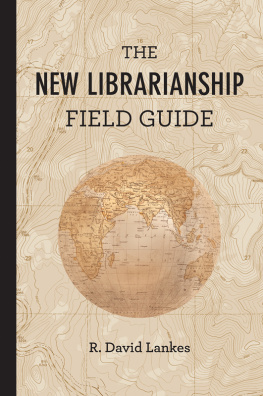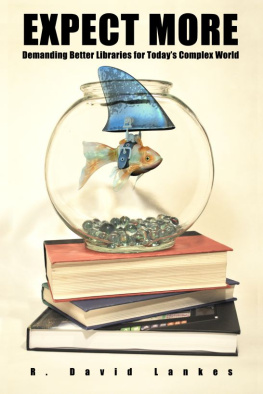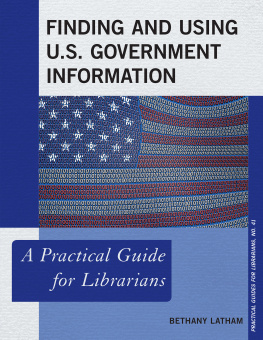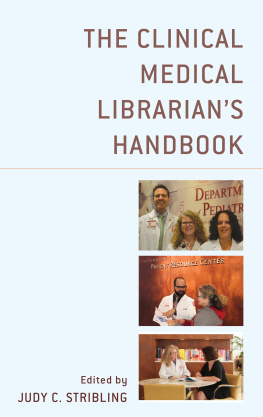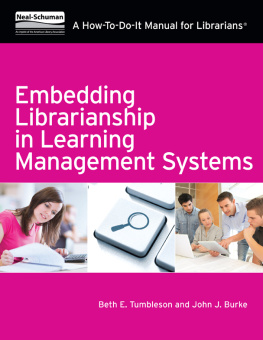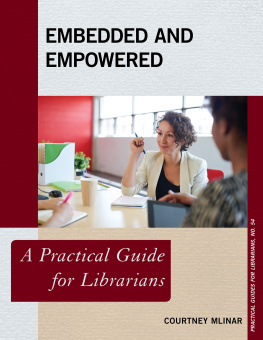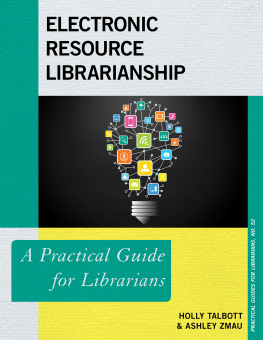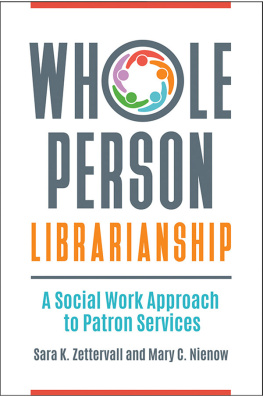The New Librarianship Field Guide
R. David Lankes
with contributions from Wendy Newman, Sue Kowalski, Beck Tench, and Cheryl Gould
and guidance from the New Librarianship Collaborative: Kimberly Silk, Wendy Newman, and Lauren Britton
The MIT Press
Cambridge, Massachusetts
London, England
2016 R. David Lankes
All rights reserved. No part of this book may be reproduced in any form by any electronic or mechanical means (including photocopying, recording, or information storage and retrieval) without permission in writing from the publisher.
This book was set in Stone Sans Std and Stone Serif Std by Toppan Best-set Premedia Limited. Printed and bound in the United States of America.
Library of Congress Cataloging-in-Publication Data
Names: Lankes, R. David, 1970 author.
Title: The new librarianship field guide / R. David Lankes.
Description: Cambridge, MA ; London, England : The MIT Press, [2015] | Includes bibliographical references and index.
Identifiers: LCCN 2015039943 | ISBN 9780262529082 (pbk. : alk. paper)
eISBN 9780262334594
Subjects: LCSH: Library sciencePhilosophy. | Libraries and community. | Libraries and society. | LibrariansAttitudes.
Classification: LCC Z665 .L375 2015 | DDC 020.1dc23 LC record available at http://lccn.loc.gov/2015039943
10987654321
This book is dedicated to the librarians of Paris and Ferguson.
It is dedicated to the librarians of Alexandria and Baltimore.
It is dedicated to the librarians in Beirut and New York City.
It is dedicated to those librarians who show us that librarians chose to make a difference.
These librarians call us all to stand against the terror and the ignorance and the hopelessness of violence and destruction. These librarians show us the response to mans inhumanity to man should be in knowledge, community, and a rededication to fight prejudice. They show us that in the darkest times knowledge can shine a light.
Acknowledgments
My heartfelt thanks go out to Wendy Newman, Kim Silk, and Lauren Britton: the New Librarianship Collaborative. Their prompting moved me from recovering from fighting cancer back to advocating for better librarians and better libraries.
My thanks also to Steve Thomas, Lane Wilkinson, and Scott Walter for donating their time and ideas. We dont always agree, but we always seek to learn.
And last but far from least, I want to thank the many librarians and library students who shared their stories, their ideas, and their time to advance my thinking on the field and in the writing of this guide.
The field of librarianship is a noble one, but also one that at times dwells too long on negatives and personalities. Its too easy to become discouraged by venomous exchanges over Twitter, by colleagues fixation on who are the real movers and shakers in our profession, and by the tendency of some to equate rock star status with having a target on your back.
However, as I found in writing The Atlas of New Librarianship, when you look past fads and insecurities, more and more you find the field led by pioneers not only of genius and influence but also of goodwill and passion. It is this passion and the desire to make a difference that pushed me to complete this volume and to continue the quest for world domination through librarianship.
The Field Guide Online
This guide is part of a larger conversation about librarianship, one that gives rise to new tools, new resources, and new ways of convening all the time. To be part of this conversation and get access to expanded materials for these chapters, go to
http://www.NewLibrarianship.org
There you will find videos, articles, blog posts, and other resources to enhance the guide and to better prepare you for improving society through librarianship.
LibrarianshipFull Stop
Core Chapter Concept: Librarians are agents for radical positive change who choose to make a difference.
I began the introduction to library science class I teach in the summer of 2014 with a story:
The Arab Spring had come to Egypt. In early 2011, on the heels of a successful revolution in Tunisia, Egyptians took to the streets to demand reforms from a regime that had been in power for nearly thirty years. Although the media largely fixated on the protesters who occupied Tahrir Square in the Egyptian capital of Cairo, many protests started in the port city of Alexandria, where, as in Cairo, people from all generations and socioeconomic backgrounds protested to demand liberty, justice, and social equity. In an attempt to restore the constitution, what was seen primarily as a peaceful uprising led to the death of at least 846 people and the injury of an additional 6,000 across Egypt.On January 28 at 6 p.m., after the prisons had opened, releasing murderers and rapists, all security forces withdrew, and gangs of looters roved the streets of Alexandria to take advantage of the resulting chaos.
In Egypts chief port city, the violence and looting devastated government buildings. Where offices once stood, only burned-out rubble remained. Protesters went from building to building, pulling down the symbols of corrupt power. Some looters and protesters then began to eye the Library of Alexandria.
President Mubarak, the focus of the uprising, had built the modern library in 2002 at a cost of about $220 million, to recapture the spirit of openness and scholarship of the original,the famous ancient Library of Alexandriaone of the marvels of the ancient world.
When it became apparent that the library might be in danger, protesters joined hands and surrounded it. Their goal was not to attack the library or to raid it, but to protect it. And, indeed, throughout the protests and looting, the protestersmen, women, and childrenstood firm and did protect the library. In essence, they were retaking the library for the people. Even after the uprising subsided, President Mubarak stepped down, and the protesters were celebrating their victory around the country, not a window of the library was broken, and not a rock was thrown against its walls. Why, in the midst of tearing down the regime, did the people of Alexandria protect their library?
My answer was that, over the years, the librarians had been a service to the community and become part of the communitynot simply a service of a government seen as disconnected and corrupt. I went on to say the reason the library was unscathed was not that the librarians inside it were exceptional, but rather that they did their job. To be clear, they were brave and brilliant, but to call them exceptional is to expect too little of every other librarian. This was the bar, I argued, that all librarians should strive toward.
When I tell this story to students or practicing librarians, Im met with an unspoken fearful question: Would I be expected to support a revolution or take part in an uprising? I would respond with a lighthearted joke to set my audience at ease and move on.
Among those attending that summer 2014 class was Jennifer Ilardi, who also worked in the Florissant Valley Branch of the Saint Louis County Public Library. Turns out that the Florissant Valley Branch serves the same school district that the Ferguson Public Library does in Ferguson, Missouri. After the class ended, Jennifer got on a plane and went home. And then a white policeman shot and killed an unarmed black teenager in Ferguson and the city exploded.
A militarized police forceclad in body armor, helmets, and camouflage uniformsshot rubber bullets and tear gas at the protesters. Children huddled in their homes, unable to sleep as their parents took turns watching the front door for trouble, and their fathers sat next to a baseball bat just in case. The Missouri governor called up the State Police and National Guard, announced curfews, and closed governmental institutions.

